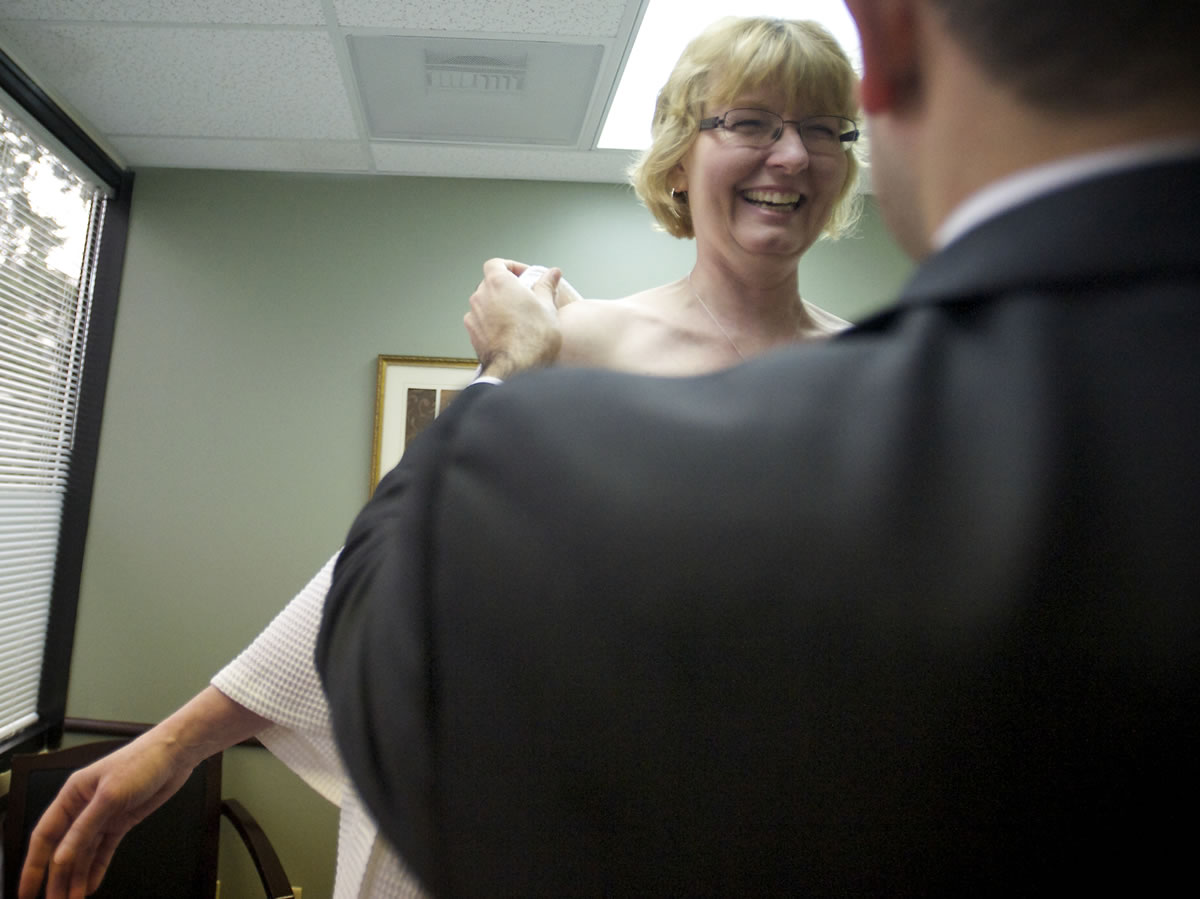For more than 30 years, Denise Waitkus had medical coverage.
She paid her premiums and copays and never needed much more than annual checkups.
But when Waitkus and her husband divorced, the Vancouver woman was left without insurance coverage for the first time. Nine months later, in December 2010, she was diagnosed with breast cancer.
“I was in tears after the ultrasound exam because I had no health insurance, and I didn’t know what I was going to do,” Waitkus said.
o To join breast cancer survivors and other local residents Thursday, Feb. 21 in Olympia, sign up here for the Susan G. Komen of Puget Sound Advocacy Day by Friday, Feb. 15.
o The Vancouver nonprofit Pink Lemonade Project will provide free rides to and from Olympia on chartered buses. Reserve a seat by calling 360-514-1012 by Friday, Feb. 15.
o To join breast cancer survivors and other local residents Thursday, Feb. 21 in Olympia, sign up here for the Susan G. Komen of Puget Sound Advocacy Day by Friday, Feb. 15.
o The Vancouver nonprofit Pink Lemonade Project will provide free rides to and from Olympia on chartered buses. Reserve a seat by calling 360-514-1012 by Friday, Feb. 15.
She reached out to Susan G. Komen for the Cure, where she learned about the Washington Breast, Cervical and Colon Health Program. The program provides free breast, cervical and colon cancer screening to low-income Washington residents who are uninsured or underinsured. The program’s $9.1 million budget is funded by a mix of federal and state dollars and grants from Susan G. Komen affiliates.
The number of screenings provided is dependent on resources, and currently, the Washington State Department of Health is unable to serve all of the people who are eligible for the program, said Megan Celedonia, the state program manager.
Each of the last three fiscal years, as many as 20,000 women have received screenings, which have an average cost of $457, Celedonia said.
The future of the program, however, is uncertain. A current budget proposal would cut the budget by 28 percent in the 2014 fiscal year and 70 percent in the 2015 fiscal year. The program is not expected to be funded in the 2016 fiscal year, Celedonia said.
The assumption is once federal health care reform is implemented, the state won’t need the program, Celedonia said. Whether the assumption is accurate, however, is also uncertain.
State data shows that 70 percent of current Breast, Cervical and Colon Health Program clients would be eligible for expanded Medicaid. National studies indicate about 10 percent of Washington’s eligible population won’t retain coverage due to financial hardship. In Washington, that 10 percent equates to 22,000 women between the ages of 18 and 64, Celedonia said.
Based on those numbers, in the 2014 fiscal year the state estimates 1,703 women would not be screened for cancer; 511 women would have abnormal findings that go undetected; and 46 would have cancers that go undiagnosed, Celedonia said.
Those numbers increase in the 2015 fiscal year.
“These patients aren’t just numbers,” said Dr. Allen Gabriel, a Vancouver plastic surgeon. “They are people.”
Gabriel is the founder of the Pink Lemonade Project, a Vancouver-based nonprofit advocacy group that provides educational retreats for breast cancer patients and survivors. Gabriel, who specializes in breast reconstruction surgery, has provided care for countless women enrolled in the Breast, Cervical and Colon Health Program and its companion program, the Breast and Cervical Cancer Treatment Program.
The treatment program pays for costs associated with breast and cervical cancer treatment. Funding for that program may be eliminated completely, according to the Susan G. Komen foundation.
Clark County breast cancer survivors and local residents are teaming up with advocates across the state to champion for the programs. Next week, they’ll meet with legislators in Olympia to advocate for program funding.
For Waitkus, the program is personal.
“I just don’t want to see the program cut,” she said. “It benefited me and it will benefit other women.”
Initially, Waitkus hesitated to get her annual mammogram. Shelling out $250 for the exam was going to strain her tight budget.
Waitkus and her teenage son were living on her small income and child support. She didn’t qualify for Medicaid, but she couldn’t afford to pay for health coverage.
But Waitkus has a family history of breast cancer, so she made the mammogram a priority. The mammogram was irregular, meaning Waitkus needed an ultrasound.
The ultrasound revealed more bad news. Waitkus needed a biopsy. The Breast, Cervical and Colon Health Program paid the bill.
“I honestly could not have afforded to have the procedure if not for the program,” she said.
Waitkus had a double mastectomy in February 2011. The next month, she began chemotherapy. By August, Waitkus was wrapping up her treatment and planned to return from medical leave to her job as a dental lab courier. Instead, her employer laid her off.
Unemployed and unable to find work, Waitkus decided in January 2012 to go back to school to improve her job prospects.
In July 2012, Waitkus underwent another surgery, this time to reconstruct her breasts. The state program paid for the procedure (Federal law requires health insurance plans that cover mastectomies to also cover breast reconstruction surgeries).
“I’m trying to persevere through all this, but if this program weren’t here, I wouldn’t be,” Waitkus said. “I wouldn’t be here.”
Waitkus and Gabriel hope the program will be around for other women in need.
“The underinsured women cannot go without this program,” Gabriel said. “We cannot make the assumption the Affordable Care Act will take care of them. We cannot make that assumption.”
Marissa Harshman: 360-735-4546; http://twitter.com/col_health; http://facebook.com/reporterharshman; marissa.harshman@columbian.com




